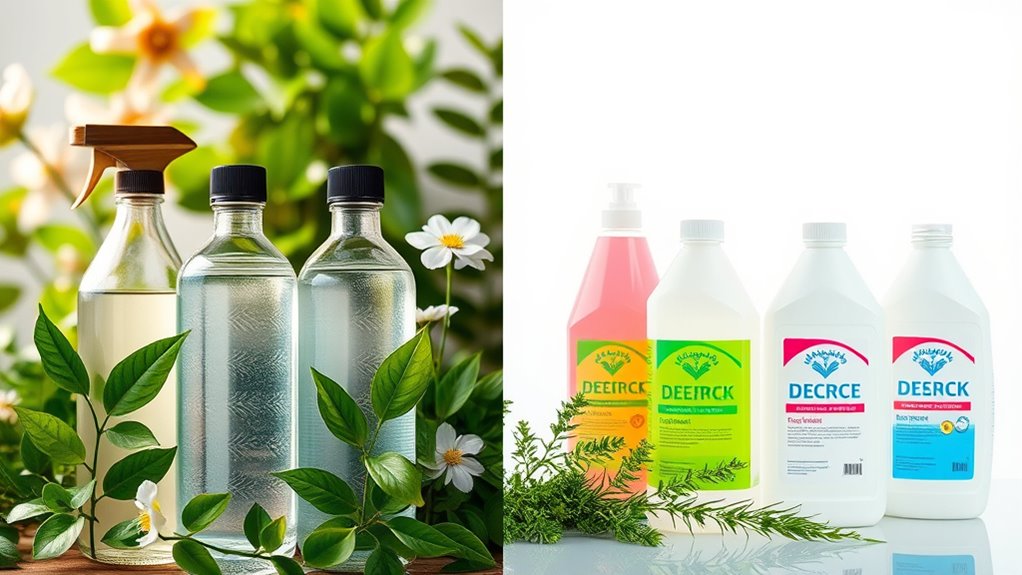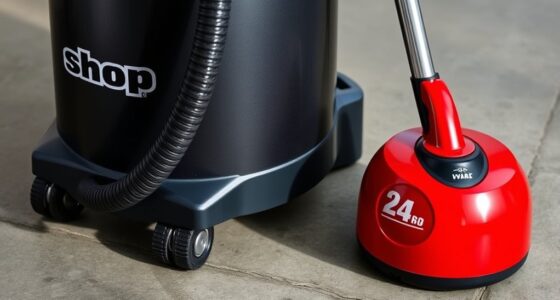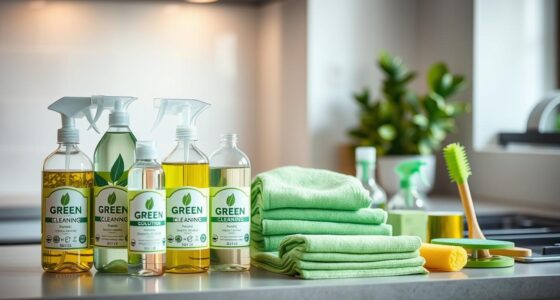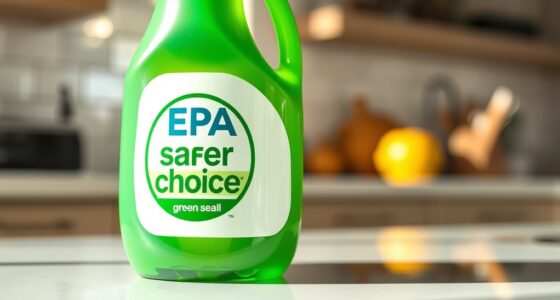When choosing between biodegradable cleaners and conventional detergents, you’ll find that biodegradable options break down faster and are gentler on the environment, reducing pollution and harm to aquatic life. They often use natural, plant-based ingredients and cause less residue. While they might cost a bit more upfront, their long-term benefits support eco-friendly living. To understand how to balance these factors and make informed choices, you’ll want to explore the details further.
Key Takeaways
- Biodegradable cleaners use natural ingredients and break down quickly, reducing environmental pollution compared to synthetic chemical-based conventional detergents.
- Although more expensive initially, biodegradable products can be more cost-effective long-term due to reduced ecological cleanup costs.
- Conventional detergents often contain persistent synthetic chemicals that harm aquatic life and pollute water sources.
- Biodegradable cleaners support eco-friendly industries and minimize ecological footprints, especially near water bodies.
- Choice depends on balancing environmental benefits with budget considerations, with many consumers valuing sustainability over upfront costs.

When choosing cleaning products, you might notice a growing number of options labeled as biodegradable, but understanding how they compare to conventional detergents is essential. One of the key differences lies in their environmental impact. Biodegradable cleaners are designed to break down more quickly and completely in the environment, reducing the chance of long-term pollution. Conventional detergents, on the other hand, often contain synthetic chemicals that can persist in water and soil, harming aquatic life and disrupting ecosystems. Using biodegradable cleaners can help you minimize the ecological footprint of your cleaning routine, especially if you live near water bodies or are concerned about pollution. They typically use natural ingredients, such as plant-based surfactants, which biodegrade faster and leave less residue, ensuring that your cleaning efforts don’t contribute to harmful environmental accumulation. This focus on eco-friendliness makes biodegradable options appealing to those seeking sustainable living choices.
However, the environmental benefits of biodegradable cleaners often come with a different cost comparison to traditional detergents. Generally, biodegradable products tend to be more expensive upfront. This price difference stems from the use of natural ingredients, sustainable sourcing, and sometimes more complex manufacturing processes. While conventional detergents may be cheaper and more widely available, their lower cost can be offset by the long-term environmental costs they incur, such as water pollution and harm to wildlife. When weighing the cost comparison, you should consider not just the immediate expense but also the broader impact. Investing in biodegradable cleaners might seem pricier initially, but it can save money in the long run by reducing environmental cleanup costs and supporting eco-friendly industries. Additionally, some brands offer concentrated formulas that, although more expensive initially, require less product per use, making them more economical over time.
Ultimately, your choice between biodegradable cleaners and conventional detergents depends on your priorities. If minimizing environmental impact is a top concern, the slightly higher cost of biodegradable options can be justified by their eco-friendly benefits. Conversely, if budget constraints are your main focus, conventional detergents may seem more practical, but you should remain mindful of their environmental costs. As awareness around sustainability grows, more consumers are willing to pay a premium for products that align with eco-conscious values. Balancing environmental impact and cost comparison helps you make informed decisions that support both your budget and the planet. Considering the safety of cleaning products, such as avoiding harsh chemicals, can further influence your choice and promote healthier living environments. Whether you lean toward biodegradable cleaners or stick with conventional options, understanding these factors ensures your cleaning choices contribute positively to a healthier environment.
Frequently Asked Questions
Are Biodegradable Cleaners More Effective on Tough Stains?
Biodegradable cleaners can be effective on tough stains, especially if they have eco-friendly certifications that guarantee high stain removal efficiency. While some might doubt their power, many biodegradable options contain enzymes or plant-based agents that tackle stubborn dirt effectively. You should check product labels for stain removal efficiency to find a biodegradable cleaner that meets your needs. With the right choice, you won’t have to compromise eco-friendliness for cleaning power.
Do Biodegradable Cleaners Contain Any Harmful Chemicals?
Biodegradable cleaners generally don’t contain harmful chemicals like phosphates or synthetic fragrances, making their chemical composition safer for you and the environment. They’re designed to break down easily after use, reducing environmental impact. While some may still have mild additives, they’re typically free from toxic substances found in conventional detergents. Always check labels to verify the product’s chemical makeup aligns with your safety and eco-friendly goals.
How Long Do Biodegradable Cleaners Take to Break Down?
Think of biodegradable cleaners as seeds planted in the earth; they take time to fully blossom. Typically, their biodegradation timeline ranges from a few days to several weeks, depending on factors like temperature and microbial activity. During this period, they break down into natural elements, minimizing environmental impact. This gradual process guarantees your cleaning efforts help protect the environment, making biodegradable cleaners a responsible choice for eco-conscious households.
Are Biodegradable Cleaners Safe for All Types of Skin?
Biodegradable cleaners are generally safe for most skin types, but you should still be cautious. They can sometimes cause skin irritation or allergic reactions, especially if you have sensitive skin. To stay safe, do a patch test first and wear gloves during use. If you notice any redness, itching, or discomfort, wash the area immediately and discontinue use. Always check the product label for specific skin safety information.
Do Biodegradable Cleaners Require Special Disposal Methods?
You don’t need to worry too much about special disposal methods for biodegradable cleaners. Just follow local disposal regulations and composting guidelines when possible. These cleaners break down naturally, so they’re gentler on the environment, and proper disposal helps guarantee they decompose fully. In most cases, simple disposal methods suffice, but always check your community’s rules to do your part in protecting the planet.
Conclusion
Choosing biodegradable cleaners over conventional detergents means you’re embracing a gentler, more eco-friendly option that breaks down naturally, unlike harsh chemicals lingering in water and soil. Imagine your home sparkling clean, while the environment breathes easier, free from toxic residues. By making this switch, you’re not just cleaning your space—you’re helping preserve the planet’s beauty for future generations. It’s a small change that leaves a big impact, blending freshness with responsibility.








